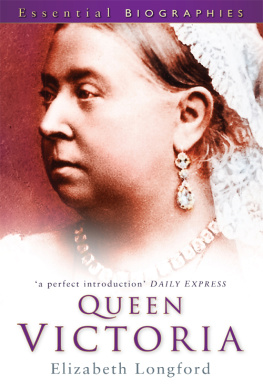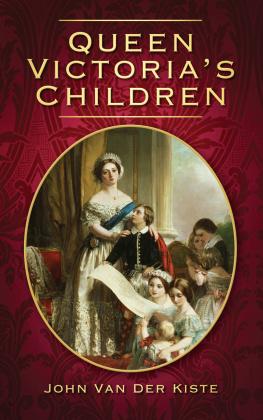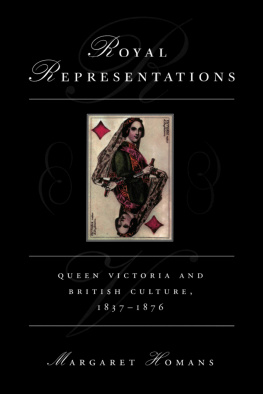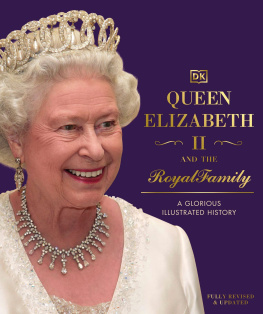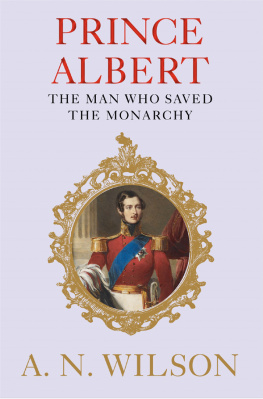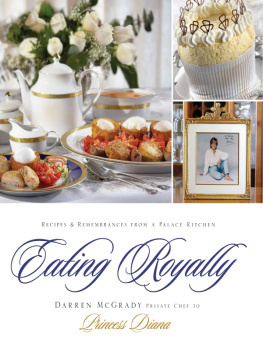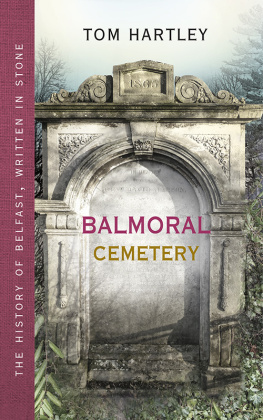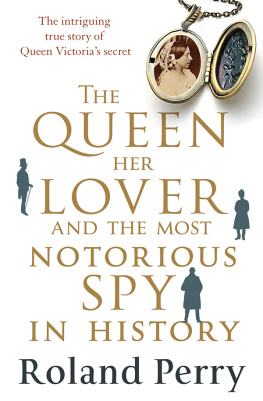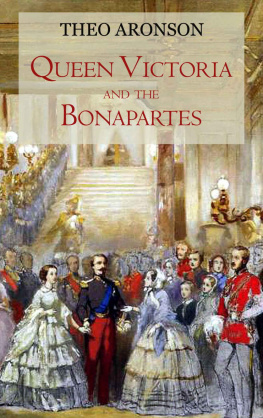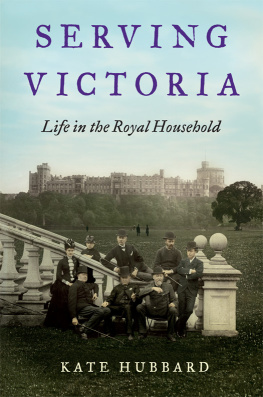BALMORAL
Queen Victorias Highland Home
Ronald Clarks engagingly readable account of Queen Victorias relationship with Our dear Balmoral and the life that went on there.
The biography of Balmoral begins with the first visit to Scotland of the young Queen Victoria and her husband Prince Albert in 1842. Five years later, while bad weather envelops the Royal party in western Scotland, the son of the Queens physician, convalescing in Old Balmoral, reports blazing sunshine from Upper Deeside. The death of his host shortly afterwards opens the way for the Royal acquisition of the Balmoral estate and the building of the new Castle in 1853-55.
In the period up to Alberts death in 1861 Balmoral becomes the setting for many of the Royal couples happiest moments as they revel in the beauties of the scenery, relish the picturesque pageantry of Highland life, enjoy their incognito expeditions into the surrounding country, and in Alberts case discover a passionate enthusiasm for deer-stalking. After the Prince Consorts death Balmoral becomes a mausoleum of memories, but also a source of strength enabling the Queen to survive her devastating loss. About the time of the Golden Jubilee of 1887 there is an Indian summer, with members of the Queens extensive family rallying round and dances and entertainments displacing some of the black-crepe gloom. In 1896 there is the colorful visit of the Tsar, with his wife and daughter. The closing section links Victorian Balmoral with the life of the Castle today.
Ronald W. Clark
Balmoral Queen Victorias Highland Home

This electronic edition published in 2011 by Bloomsbury Reader
Bloomsbury Reader is a division of Bloomsbury Publishing Plc, 50 Bedford Square, London WC1B 3DP
Copyright 1981 Ronald W. Clark
The moral right of the author has been asserted
All rights reserved
You may not copy, distribute, transmit, reproduce or otherwise
make available this publication (or any part of it) in any form, or by any means
(including without limitation electronic, digital, optical, mechanical, photocopying,
printing, recording or otherwise), without the prior written permission of the
publisher. Any person who does any unauthorised act in relation to this publication
may be liable to criminal prosecution and civil claims for damages
ISBN: 9781448201013
eISBN: 9781448202331
Visit www.bloomsburyreader.com to find out more about our authors and their books
You will find extracts, author interviews, author events and you can sign up for
newsletters to be the first to hear about our latest releases and special offers
Contents
A New Part of Her Kingdom
About six oclock on the evening of 31 August 1842, the Royal George, a man-of-war converted into Royal Yacht, set her head-sails as a light westerly breeze arose and moved into Scottish waters off St Abbs Head, the promontory jutting out eastward from the Berwickshire coast. Queen Victoria, visiting Scotland for the first time since coming to the throne five years previously, noted in her Journal that it was a beautiful evening, calm, with a fine sunset, and the air so pure.
On one of the vessels which steamed out to meet the Royal George and the flotilla which followed her, a Scottish reel was being danced and in the bows of a fishing vessel a solitary piper played. The men on the Royal Yacht begged leave to dance, which they did to the sound of a violin played by a little sailor-boy; they also sang. As the last light faded, the Queen and her husband Prince Albert remained on deck, watching the bonfires which blazed out from a string of summits on the Lammermuirs, from Dunbar, and from the hummocky protrusion of North Berwick Law. We felt most thankful and happy, wrote the Queen, that we were near our journeys end.
Victorias voyage in 1842 was the first in a series of steps which were to bring her eventually to Balmoral Castle largely by chance, that random falling of the cards which, as Churchill once wrote, settles whether an officer ends up a shattered wreck or the commander of a division. The outcome was more than the creation of a new Royal home. The Queens devotion to it led to a strengthening of the links between the Crown and the people of Scotland. And although initially a retreat, where it was hoped that the stresses of official duty might be less wearing, the new home soon became an influential environment in which the Queen discussed State affairs with her ministers. As early as 1855 Count Helmuth von Moltke, soon to become chief of the Prussian General Staff, was to tell his wife from the Castle that here the Court of one of the most powerful states resides, and from these mountains the fate of the world is often essentially modified. Indeed, there were to be times when the very existence of Balmoral, 550 miles from the seat of Government, affected the flow of history.
We do not know whether the Queen herself at first fully realized the dangers, or the potential advantages, of spending weeks, and later months, in a northern home which before the days of telephone or radio had a remoteness it is now difficult to appreciate. Throughout the 1860s and 1870s the sanctuary for such it almost became certainly encouraged a distraught widows isolation from affairs and, through this, the incipient republicanism of the day. On the credit side, if it was not a safety-valve from duties for the Queens red despatch boxes, which could never be ignored, never ceased to arrive, come hell or high water or even the Scottish snows then it was at least an invigorating environment which in the early years had an almost fairy-tale quality of escape.
The visit in 1842 came almost a century after the 45, the last abortive attempt to regain the throne made by the Stuarts, known as the Stewarts until the reign of Mary, Queen of Scots. The Acts which, after the defeat at Culloden, ordained that a Highlander should never possess any gun, sword or arm whatever, and never use tartan, plaid or any part of the Highland garb, had been repealed in 1782. By 1842 it was no longer an indictable offence to drink, after dinner and with a dish of water on the table, to The King over the water. Prince Charles Edward Louis Casimir Stuart, once known as the Young Pretender, had been dead for more than fifty years.
But some loyalties had been slow to fade. Until 1820 Braemar Castle, ten miles up-river from Balmoral, had been garrisoned by British troops as a reminder of Hanoverian victory. To some Scots the 1707 Act of Union which transformed Scotland and England into a single kingdom still remained a betrayal, and to some the skirl of the pipes declared an instrument of war after the 45 was not only entertainment but an omen of retribution to come. Scotland had spawned no tartaned Fenians and had been spared the equivalent of the Irish Troubles. Yet the relationship with Westminster and the British Crown lacked the emotional cordiality of the auld alliance with France, and there remained a task which could perhaps be tackled, whether consciously or not, by an attractive young Queen in her early twenties; particularly a Queen who could boast of her exiguous Stewart blood, speak sincerely of poor Queen Mary and refer to her ancestor not only as James I of England but as James VI of Scotland.
There is little firm evidence that in 1842 Victoria decided to investigate Scotland with any deep political motives. But she knew that, until George IV had visited Edinburgh twenty years previously, no Hanoverian monarch had set foot north of the Border. George had, moreover, circumscribed his visit to the Scottish capital and its immediate surroundings. Victoria, after the sudden cancellation of a visit to Belgium, now planned something more ambitious a Royal Progress that would take her from Edinburgh to Perth, and then on into the Highlands where she and Prince Albert would be guests of the Marquis of Breadalbane at Taymouth Castle. It is difficult to believe that Her Majesty, already quite aware of political niceties, failed to consider the possible repercussions of the venture.


